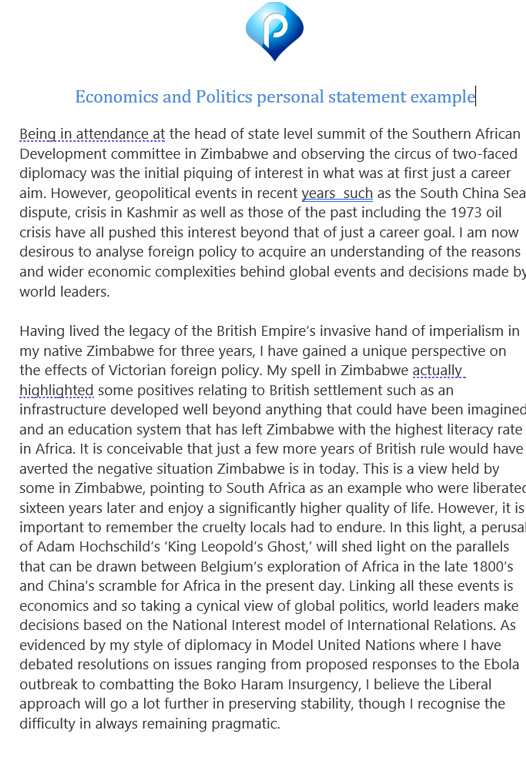- Reading time: 3 minutes
- Price: Free download
- Published: 20th October 2021
- Price: Free download
- Word count: 663 words
- File format: Text
Preview:
Being in attendance at the head of state level summit of the Southern African Development committee in Zimbabwe and observing the circus of two-faced diplomacy was the initial piquing of interest in what was at first just a career aim. However, geopolitical events in recent years such as the South China Sea dispute, crisis in Kashmir as well as those of the past including the 1973 oil crisis have all pushed this interest beyond that of just a career goal. I am now desirous to analyse foreign policy to acquire an understanding of the reasons and wider economic complexities behind global events and decisions made by world leaders.
Having lived the legacy of the British Empire’s invasive hand of imperialism in my native Zimbabwe for three years, I have gained a unique perspective on the effects of Victorian foreign policy. My spell in Zimbabwe actually highlighted some positives relating to British settlement such as an infrastructure developed well beyond anything that could have been imagined and an education system that has left Zimbabwe with the highest literacy rate in Africa. It is conceivable that just a few more years of British rule would have averted the negative situation Zimbabwe is in today. This is a view held by some in Zimbabwe, pointing to South Africa as an example who were liberated sixteen years later and enjoy a significantly higher quality of life. However, it is important to remember the cruelty locals had to endure. In this light, a perusal of Adam Hochschild’s ‘King Leopold’s Ghost,’ will shed light on the parallels that can be drawn between Belgium’s exploration of Africa in the late 1800’s and China’s scramble for Africa in the present day. Linking all these events is economics and so taking a cynical view of global politics, world leaders make decisions based on the National Interest model of International Relations. As evidenced by my style of diplomacy in Model United Nations where I have debated resolutions on issues ranging from proposed responses to the Ebola outbreak to combatting the Boko Haram Insurgency, I believe the Liberal approach will go a lot further in preserving stability, though I recognise the difficulty in always remaining pragmatic.
My three years in Zimbabwe and frequent trips back have also enables me to observe a nation on its development journey despite the far-reaching corruption that has warped the system. Living in Zimbabwe, you begin to understand that diplomacy is multi-faceted as international players attempt to orchestrate political change.
The opportunity to study Economics, History and Politics at A-Level has given me a well rounded introduction into how the global economy and political system are interconnected as well as providing me with the skills to analyse and critically evaluate arguments. Having studied the German Reformation in depth, I observed broad similarities between this event and Brexit. Taking Economics has also shown me how the basic issue of the scarcity of resources influences almost every major dispute in the international arena, whilst studying Politics has taught me that domestic legislative bodies and public political opinion have huge influence on foreign policy decisions made by government as well as shedding light on why public opinion was ignored as it was by the Blair government in 2003 on Iraq.
Aside from academia, I am a keen rugby player with my local club which has helped develop my leadership skills and teamwork whilst my volunteering with a startup charity has strengthened my sense of community and organisational skills.
The decision to choose this degree was facilitated by a taster course at Kings College and an online course in Global Diplomacy from SOAS. I one day hope to be at the centre of international politics, taking part in shaping the foreign policy of Zimbabwe or Africa as a whole in the African Union and so I believe the interdisciplinary nature of this degree not only suits my cosmopolitan mindset but will also give me the foundation to pursue my dream.
Related personal statements:
- International Financial Management MSc Personal Statement Example
- Mathematics BSc (Hons) personal statement example
- Accounting BSc Personal Statement Example
- Human Resources Management Program Personal Statement Example
- Finance and Economics MSc Personal Statement
- Accounting and economics degree personal statement example
- Economics personal statement
- Marketing & finance personal statement example (Masters)
- Statistics personal statement example
- Accounting personal statement example
Review this personal statement:
Latest reviews:
There are no reviews yet. Be the first one to write one.
